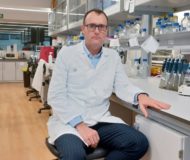

Researchers at the Sant Pau Research Institute (IR Sant Pau) have taken part in a pioneering study that has demonstrated, for the first time, that gene therapy can be an effective and safe therapeutic option for patients with Fanconi anaemia, a rare condition characterised by progressive bone marrow failure and a high predisposition to cancer. The results, published in the prestigious journal The Lancet, are the culmination of over two decades of preclinical research and seven years of patient follow-up.
Fanconi anaemia, a genetic disease often diagnosed in childhood, leads to the gradual loss of blood cells, causing severe infections, fatigue, and bleeding. Until now, the only definitive treatment has been a bone marrow transplant from a compatible donor, a procedure requiring prior chemotherapy and associated with significant risks, including prolonged hospitalisation.
No clinical studies conducted to date had succeeded in making gene therapy effective for this complex disease. However, the recently published work has demonstrated that, even without chemotherapy conditioning, the autotransfusion of haematopoietic stem cells corrected for the genetic defect leads to a progressive increase in corrected cells in most patients. In two treated patients, the proportion of corrected cells exceeded 90%, effectively halting the disease’s natural progression, which would otherwise involve the steady depletion of blood cells.
The Phase I/II clinical trial was led by the Fundación Hospital Niño Jesús in Madrid, with the long-term follow-up study overseen by Rocket Pharmaceuticals Inc. Dr Julián Sevilla, supported by Dr Josune Zubicaray—both haematologists at the Advanced Therapies Unit of the Niño Jesús University Children’s Hospital and members of the CIBER for Rare Diseases (CIBERER)—served as principal investigators under the scientific direction of Professor Juan Bueren. Dr Paula Río, the study’s lead author, and Dr Susana Navarro, both researchers at CIEMAT—a body under the Ministry of Science, Innovation and Universities—along with the Rare Diseases Area of CIBERER and the Fundación Jiménez Díaz Health Research Institute (IIS-FJD), were also key collaborators. Additionally, the study was coordinated with the National Advanced Therapies Network (TERAV), promoted by the Carlos III Health Institute.
Until now, bone marrow transplants from healthy, compatible donors were the sole definitive treatment for bone marrow failure in these patients. While this therapy has improved significantly over recent years, it still requires chemotherapy conditioning to prevent rejection and is linked to both short- and long-term risks, often necessitating extended hospital stays.
Professor Jordi Surrallés, director of IR Sant Pau and CIBERER group leader, was among the researchers involved in the study. “The teamwork within the National Fanconi Anaemia Research Network has positioned Spain as a global leader in advanced therapies for this disease. This research marks an unprecedented milestone in the treatment of Fanconi anaemia,” he stated.
The gene therapy detailed in The Lancet was developed with contributions from numerous teams responsible for the various stages of its application. The collection and purification of stem cells mobilised from patients’ blood were carried out at Niño Jesús University Children’s Hospital in Madrid, Vall d’Hebron University Hospital in Barcelona, and the Catalan Blood and Tissue Bank, coordinated by Dr Cristina Díaz de Heredia. These cells were then corrected for the genetic defect ex vivo at the CliniStem Cleanroom of CIEMAT using a genetically modified virus (a lentiviral vector carrying the FANCA gene) developed earlier by the research team.
Once corrected for the genetic defect, the cells were reinfused into patients at the Paediatric Haematology Service of the Niño Jesús Hospital as an autotransfusion, without requiring chemotherapy. This allowed patients to be discharged just 72 hours after the infusion.
The investigation that led to these results began more than two decades ago with preclinical studies at CIEMAT laboratories, where a lentiviral vector carrying the FANCA gene was developed to correct the genetic defect in stem cells. This vector, recognised as an Orphan Drug in Europe and the United States, paved the way for the clinical trials culminating in this publication in The Lancet.
The study confirms that chemotherapy can be avoided in patients with Fanconi anaemia—a remarkable achievement given the fragility of these patients’ stem cells. Researchers have shown that an autotransfusion of corrected cells is sufficient to halt, and in some cases even reverse, bone marrow failure.
Rocket Pharmaceuticals is currently working with the European Medicines Agency and the US Food and Drug Administration to obtain marketing authorisation for this therapy. Meanwhile, preclinical studies are underway to expand this therapeutic approach to other subtypes of Fanconi anaemia, potentially increasing the number of patients who could benefit from this innovation.
This breakthrough offers new hope for patients and their families. Alicia de las Heras, president of the Fanconi Anaemia Foundation, expressed: “A few years ago, this advancement seemed unimaginable. Now, thanks to science and the tireless efforts of our specialists, we have real hope for our children.”
This study reinforces Spain’s leadership in developing innovative therapies for rare diseases, consolidating biomedical research as a driver of global health progress.
Haematopoietic gene therapy of non-conditioned patients with Fanconi anaemia-A: results from an open-label phase I/II and long-term clinical trials. Río, P., Zubicaray, J., Navarro, S., Gálvez, E., Sánchez-Domínguez, R., Nicoletti, E., Sebastián, E., Rothe, M., Pujol, R., Bogliolo, M., John-Neek, P., Bastone, A. L.,Schambach, A., Wang, W., Schmidt, M., Larcher, L., Segovia, J.C., Yáñez, R. M., Alberquilla, O., Díez, B., Fernández-García, M., García-García, L., Ramírez, M., Galy, A., Lefrere, F., Cavazzana, M., Leblanc, T., García de Andoin, N., López-Almaraz, R., Catalá, A., Barquinero, J., Rodríguez-Perales, S., Rao, G., Surrallés, J., Soulier, J., Díaz-de-Heredia, C., Schwartz, J. D., Sevilla, J., Bueren, J.A.,& on behalf of the FANCOLEN-1 gene therapy investigators. The Lancet, 2024, Vol 404. https://www.thelancet.com/journals/lancet/article/PIIS0140-6736(24)01880-4/fulltext
